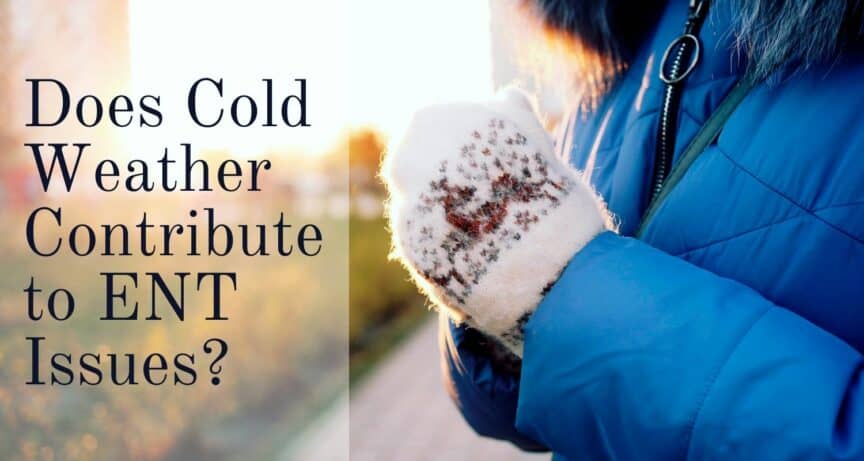As temperatures decrease and we navigate the winter months, people tend to experience more issues related to the ear, nose, and throat. We often associate colder weather with ear infections, the common cold, and the flu. But does cold weather cause these ENT issues?
Though many people experience these common winter illnesses, cold weather is not the actual cause. Colder temperatures however do contribute to spreading viruses, worsening symptoms, and affect how the immune system responds. Illnesses that are more pervasive during winter months – like sinus issues, colds, and the flu – are caused by viral infections rather than colder temperatures. But understanding how cold weather exacerbates symptoms can better help you stay healthy in the upcoming months.
Impact of Cold Weather on Common ENT Issues
While cold weather doesn’t inherently produce illness, it can amplify symptoms and make it easier for viruses to spread. Here is how colder temperatures impact the most common ENT related health issues:
- Colds and Sinus Infections: The common cold, as well as sinus issues, are caused by viral infections. Because people are more likely to stay indoors during winter months while living in close proximity to others, this results in less ventilation which allows viruses to spread. Additionally, the usage of heat during colder months means that more dry air is flowing through one’s living space. Dry air reduces the capacity of the mucus membrane to prevent viruses from penetrating nasal airways.
- Sore Throat and Runny Nose: Both a sore throat and runny nose are symptoms that can be produced by different issues including viral infections or allergies. These symptoms can be further irritated by dry air exposure from staying indoors and/or allergens in living spaces (dust, pet dander, etc.).
- Ear Infections: ear infections are typically caused by bacterial or viral infections in the middle ear. Ears are particularly vulnerable to colder temperatures as they’re more exposed. Cold weather can impact blood circulation in the ears, trigger tinnitus, or lead to pain if exposed for a long period of time.
Cold weather does not lead to infection but it can certainly worsen symptoms as well as contribute to infections spreading more easily. This makes us more vulnerable to experiencing these common ENT issues during the winter months.
Treating Common ENT Issues
Common illnesses that are usually experienced more during colder months typically resolve themselves without medical intervention. People typically take over the counter medications to alleviate symptoms, this includes:
- antihistamines (Benadryl, Claritin, Zyrtec) which alleviate symptoms associated with allergies – sneezing, watery eyes, runny nose, etc.
- decongestants which reduce congestion or a stuffy nose.
- pain relief medications (Advil, Tylenol, ibuprofen) to treat fevers and/or discomfort.
If symptoms persist, or for people with compromised immune systems, it may be necessary to see a healthcare specialist like an ENT doctor. Your healthcare provider will use different diagnostics to identify the underlying condition that is producing your symptoms which will inform the best path for treatment. This can include:
- Allergies: taking antihistamines is a common way people manage their allergy symptoms. Additionally, immunotherapy is an option your doctor could recommend. These allergy shots involve injecting small doses of the allergen so the body can build up resistance to it.
- Viral or bacterial infections: common treatment for these infections is antibiotics which are prescribed and typically taken for up to two weeks.
Untreated symptoms that persist can affect health and wellness in a variety of ways. Be sure to take action to address health concerns during colder months especially!
Tips to Stay Healthy During Colder Months
There are simple things you can do to protect your health during colder months. A few tips include:
- Bundle up: a useful way to stay warm while outdoors is by bundling up. This includes wearing earmuffs or hats to cover your ears and head, scarves, and gloves that provide warmth.
- Seasonal flu shot: the seasonal flu shot can significantly reduce your risk of getting the most common strains of influenza that cause the flu.
- Wash hands: be sure to consistently and thoroughly wash your hands to reduce exposure to bacteria.
Practicing safety measures is particularly important now as we continue to live through the pandemic. To address any ENT issues, contact us to schedule an appointment. We are here to help you stay the healthiest during these colder months.

